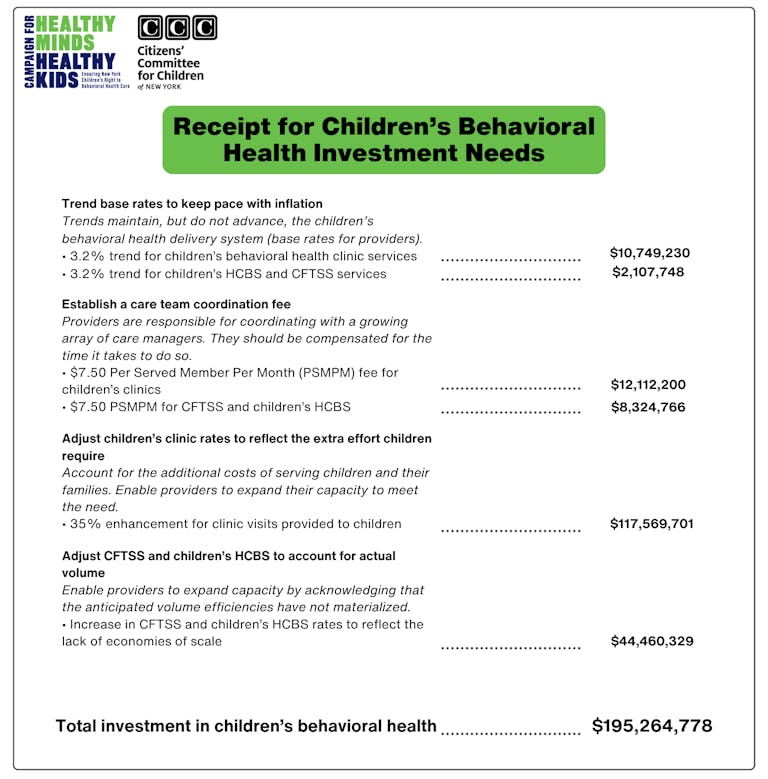

Real Change for New York’s Youth Mental Health Crisis Will Require Specific Choices
Insights
February 5, 2024
By: Julie Kronick
This budget season, a common theme has emerged for leaders at both the State and City level: social media is a mental health hazard for teens and children. While it is true that social media does impact mental health, real change for New York’s youth will require specific choices that impact whether providers are available to meet family needs. We need stronger investments in the behavioral (mental and substance abuse) health system to boost our provider network so youth can receive the help they need when they need it, and not months or years later.
Last week NYC declared social media a “public health hazard” following the announcement made by Mayor Adams during his annual State of the City address. The NYC Departments of Health and Mental Hygiene stated that the number of high school students experiencing hopelessness has increased by more than 40% between 2011 and 2021 and has now released guidelines for parents around the topic. Prior to that, Governor Hochul and Attorney General James announced further movement on a pair of measures that would restrict social media platforms from collecting data from minors and exposing them to addictive algorithms.
Discussion around social media impact is not new, and it is imperative that awareness around the effects of social media is elevated, but the conversation must go deeper. As part of the Campaign for Healthy Minds, Healthy Kids (HMHK), we turn to campaign members for insight, and last year Dr. Jennifer Havens and Kayleigh Zaloga addressed this very topic in a Times Union Op-ed in November 2023: “There’s no question that we need to pay attention to the role social media plays in the mental health of young people. But it is just one piece of a much larger and more complex problem.” In fact, Mashrafi “Mash” Anwar, HMHK Youth Council Leader from the Youth & Caregivers Council, wrote a piece last summer touching on just this fact with his perspective as a young New Yorker. In his piece, Anwar writes on participating in the statewide mental health listening tour that Governor Hochul hosted last year. Though he appreciated the work put in to invite and include youth voices in the solution seeking, he felt that the focus was also heavy on social media and lacking in deeper discussions. He states, “the summit’s heavy focus on the effects of social media left little room to discuss other major issues impacting youth’s mental health. Many of the strategies presented…placed blame on youth and families for how they use social media instead of asking what the root causes of their social media use was, including family stressors, trauma, and lack of community resources.”
In the recent coverage of the City’s designation of social media as a public health hazard on NBC New York, CCC’s Executive Director Jennifer March also offered some important insight on the issue at large. Focusing on social media as the main concern impacting child and teen mental health distracts from a larger picture of instability in the state’s ability to provide needed services and address the growing need overall. Much of the crisis we are facing as a state and city around youth mental health comes from decades of disinvestment and a disconnect in services.

While the Health Commissioner’s suggestions (from the news segment and health notice) strongly urging limitations on social media usage for children under age 14, and other measures for protecting teens and children, are pertinent, it is important to point out that data shows that half of all lifetime cases of “mental disorders” begin by age 14, illustrating a need to go deeper than the impact of smartphone usage. In fact, we know the most effective way for our state to tackle mental health needs for youth is to offer treatment options for families and youth that are easy to access and readily available. This becomes even more clear when you look at treatment data showing that the average delay between onset of mental illness symptoms and treatment is 11 years. The reality for families in New York is that there are only 28 child psychiatrists per 100,000 children. Decades of disinvestment have left families with fewer and fewer options for care as the crisis worsens. As a result, providers across the state are facing severe workforce shortages, and families are left struggling to find support, often waiting months for critical care their children urgently need. Ultimately, this has a long-standing impact, compounding issues for families. Because they cannot get the care they need when they need it, children end up in emergency rooms, hospitals, the juvenile justice system, or even foster care.

New York is at a breaking point. If we don’t act now, we risk raising another generation of children whose unmet mental health needs become deeper, more complex, and more difficult to treat as they become adults. But we know exactly what investments are needed to make changes that will support solutions to this crisis. Specifically, the Campaign for Healthy Minds, Healthy Kids is urging New York leaders to invest $195 million in the next state budget to address severe reimbursement rate challenges that have undermined the behavioral health care system. This targeted investment in outpatient behavioral health services will stop the behavioral health workforce from shrinking and will begin to add back capacity to care for children in need of services. With this investment, New York’s children will be able to access help in a timelier manner and fewer families will go without needed services. HMHK put out a rate study that details specifically why this level of investment will make a difference and what the impact can be. Read the rate study here and check out an “itemized receipt” for investments recommended and how it all totals $195 million at the end of this Insight.
It is definitely important that parents and children evaluate healthy relationships with social media use and screen time. But behavioral health issues are more complex than just smartphones and require multifaceted approaches to solutions, including targeted investments in services and stronger networks of care. Outside of social media impact, children desperately need timely care options if we are to tackle real treatment and support for youth in our state. Take a stand with CCC and HMHK today to urge Governor Hochul and our State Legislature to better invest in the behavioral health system now (see button below).




